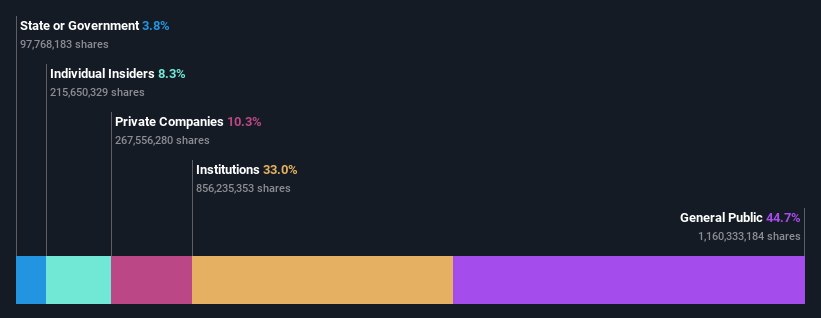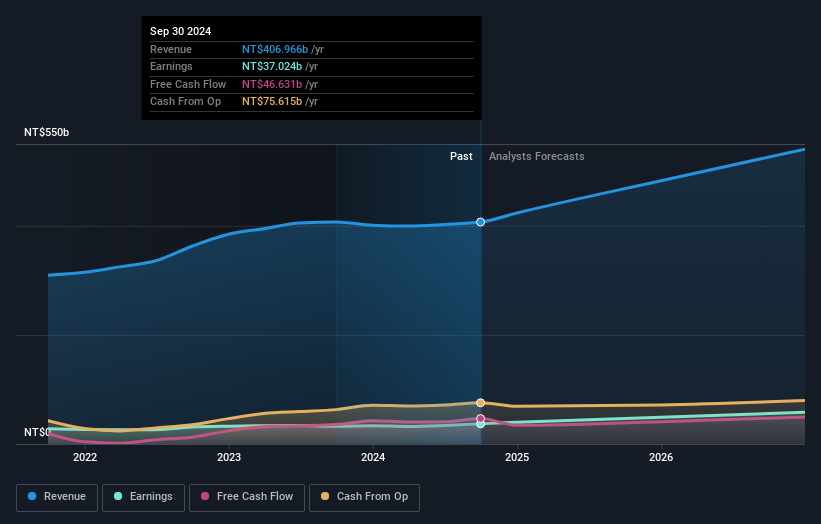- Taiwan
- /
- Electronic Equipment and Components
- /
- TWSE:2308
Institutions own 33% of Delta Electronics, Inc. (TWSE:2308) shares but retail investors control 45% of the company
Key Insights
- The considerable ownership by retail investors in Delta Electronics indicates that they collectively have a greater say in management and business strategy
- A total of 25 investors have a majority stake in the company with 44% ownership
- Institutions own 33% of Delta Electronics
To get a sense of who is truly in control of Delta Electronics, Inc. (TWSE:2308), it is important to understand the ownership structure of the business. With 45% stake, retail investors possess the maximum shares in the company. Put another way, the group faces the maximum upside potential (or downside risk).
Meanwhile, institutions make up 33% of the company’s shareholders. Large companies usually have institutions as shareholders, and we usually see insiders owning shares in smaller companies.
Let's take a closer look to see what the different types of shareholders can tell us about Delta Electronics.
Check out our latest analysis for Delta Electronics

What Does The Institutional Ownership Tell Us About Delta Electronics?
Institutions typically measure themselves against a benchmark when reporting to their own investors, so they often become more enthusiastic about a stock once it's included in a major index. We would expect most companies to have some institutions on the register, especially if they are growing.
We can see that Delta Electronics does have institutional investors; and they hold a good portion of the company's stock. This implies the analysts working for those institutions have looked at the stock and they like it. But just like anyone else, they could be wrong. If multiple institutions change their view on a stock at the same time, you could see the share price drop fast. It's therefore worth looking at Delta Electronics' earnings history below. Of course, the future is what really matters.

Hedge funds don't have many shares in Delta Electronics. Deico International Limited is currently the company's largest shareholder with 10% of shares outstanding. In comparison, the second and third largest shareholders hold about 4.1% and 3.8% of the stock. Chong Hua Cheng, who is the second-largest shareholder, also happens to hold the title of Top Key Executive. In addition, we found that Ping Cheng, the CEO has 2.1% of the shares allocated to their name.
Our studies suggest that the top 25 shareholders collectively control less than half of the company's shares, meaning that the company's shares are widely disseminated and there is no dominant shareholder.
While studying institutional ownership for a company can add value to your research, it is also a good practice to research analyst recommendations to get a deeper understand of a stock's expected performance. There are plenty of analysts covering the stock, so it might be worth seeing what they are forecasting, too.
Insider Ownership Of Delta Electronics
While the precise definition of an insider can be subjective, almost everyone considers board members to be insiders. The company management answer to the board and the latter should represent the interests of shareholders. Notably, sometimes top-level managers are on the board themselves.
Insider ownership is positive when it signals leadership are thinking like the true owners of the company. However, high insider ownership can also give immense power to a small group within the company. This can be negative in some circumstances.
Shareholders would probably be interested to learn that insiders own shares in Delta Electronics, Inc.. The insiders have a meaningful stake worth NT$85b. It is good to see this level of investment. You can check here to see if those insiders have been buying recently.
General Public Ownership
The general public-- including retail investors -- own 45% stake in the company, and hence can't easily be ignored. While this size of ownership may not be enough to sway a policy decision in their favour, they can still make a collective impact on company policies.
Private Company Ownership
We can see that Private Companies own 10%, of the shares on issue. Private companies may be related parties. Sometimes insiders have an interest in a public company through a holding in a private company, rather than in their own capacity as an individual. While it's hard to draw any broad stroke conclusions, it is worth noting as an area for further research.
Next Steps:
While it is well worth considering the different groups that own a company, there are other factors that are even more important.
I like to dive deeper into how a company has performed in the past. You can find historic revenue and earnings in this detailed graph.
Ultimately the future is most important. You can access this free report on analyst forecasts for the company.
NB: Figures in this article are calculated using data from the last twelve months, which refer to the 12-month period ending on the last date of the month the financial statement is dated. This may not be consistent with full year annual report figures.
New: Manage All Your Stock Portfolios in One Place
We've created the ultimate portfolio companion for stock investors, and it's free.
• Connect an unlimited number of Portfolios and see your total in one currency
• Be alerted to new Warning Signs or Risks via email or mobile
• Track the Fair Value of your stocks
Have feedback on this article? Concerned about the content? Get in touch with us directly. Alternatively, email editorial-team (at) simplywallst.com.
This article by Simply Wall St is general in nature. We provide commentary based on historical data and analyst forecasts only using an unbiased methodology and our articles are not intended to be financial advice. It does not constitute a recommendation to buy or sell any stock, and does not take account of your objectives, or your financial situation. We aim to bring you long-term focused analysis driven by fundamental data. Note that our analysis may not factor in the latest price-sensitive company announcements or qualitative material. Simply Wall St has no position in any stocks mentioned.
About TWSE:2308
Delta Electronics
Provides power and thermal management solutions in Mainland China, the United States, Taiwan, Thailand, and internationally.
Solid track record with excellent balance sheet.
Similar Companies
Market Insights
Community Narratives





